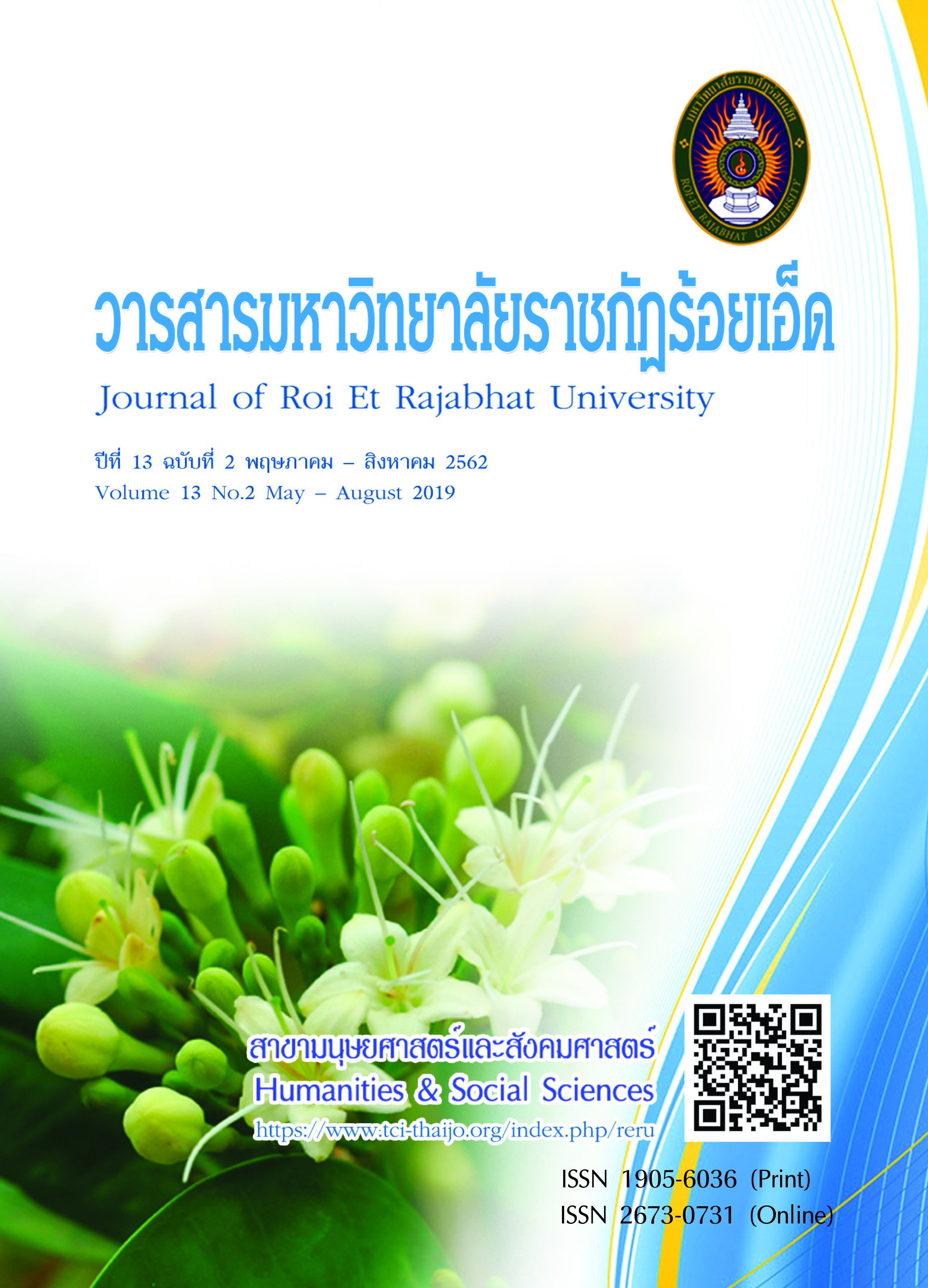Effective Time Management of School Directors: Causal Factors
Keywords:
Effective Time Management, Causal Factors, School DirectorsAbstract
"Time" is a valuable and important resource for everyone, it is a limited resource and used up, can’t buy more. So, time is used carefully. Successful people can’t avoid time management. If the school directors can manage their time incorporate with the school administration, they can improve the quality of education more effective. The aims of effective time management of the school directors are development and validation of the linear structural equation model of factors affecting an effective time management of school directors under the secondary educational service area office in the northeast developed with empirical data. The significant components comprise of the following factors 1) goal setting 2) priority setting 3) scheduling 4) time tracking 5) organizing and 6) work-life balance. On the other hand, the causal factors affecting an effective time management of school directors are 1) time management tools, which can be measured from using technology to management your time and reminder tools, 2) eliminate time waste, which can be measured from cause by yourself, cause by other people and cause by surrounding environment, 3) time management technique, which can be measured from delegating, habits management, waiting time management, collocation and positive attitude and 4) planning, which can be measured from preparation, operational planning, implement and evaluation.
References
กลุ่มพัฒนาระบบบริหาร กรมคุ้มครองสิทธิและเสรีภาพ. (2555) คู่มือการบริหารเวลา. กรุงเทพฯ: กรมคุ้มครองสิทธิ
และเสรีภาพ.
เกรียงศักดิ์ เจริญวงศ์ศักดิ์. (2550) ใครว่า...ไม่มีเวลา (บริหารเวลาเพื่อความสำเร็จ). กรุงเทพฯ: ซัคเซสมีเดีย.
เบิกอรุณ แสงแกล้วกล้า. (2559) บริหารเวลาอย่างชาญฉลาด เพิ่มโอกาสทำเงินล้าน. กรุงเทพฯ: ณ ดา.
ปพนสวรรค์ โพธิพิทักษ์. (2556) ปัจจัยและรูปแบบการบริหารเวลาของรองผู้อำนวยการ สำนักงานเขตพื้นที่การศึกษา
ประถมศึกษา. ดุษฎีนิพนธ์ ปรัชญาดุษฎีบัณฑิต สาขาวิชาการบริหารการศึกษา. กรุงเทพฯ: มหาวิทยาลัย
ศิลปากร.
ปิยพจน์ ตุลาชม. (2557) รูปแบบการพัฒนาคุณลักษณะผู้บริหารมืออาชีพของผู้บริหารสถานศึกษาระดับมัธยมศึกษา.
ดุษฎีนิพนธ์ ครุศาสตรดุษฎีบัณฑิต สาขาวิชาการบริหารการศึกษา. กรุงเทพฯ: มหาวิทยาลัยราชภัฏวไลยอลงกรณ์
ในพระบรมราชูปถัมภ์.
พนมพร จันทรปัญญา. (2545) หลุมพรางเวลาเรื่องที่ผู้บริหารต้องระวัง. เชียงใหม่: โรงพิมพ์คลองช่าง.
ภัทรวรรธน์ จีรพัฒน์ธนธร. (2554) การบริหารเวลา. กรุงเทพฯ: แม็ค.
ยงยุทธ พีรพงศ์พิพัฒน์. (2547) การบริหารเวลาอย่างมีประสิทธิภาพ (พิมพ์ครั้งที่ 2). กรุงเทพฯ: พิมพ์พรรณการพิมพ์.
สถาบันดำรงราชานุภาพ. (2553) การบริหารเวลา. กรุงเทพฯ: สำนักงานปลัดกระทรวงมหาดไทย.
สมชาย เทพแสง. (2548) การศึกษาปัจจัยบางประการที่ส่งผลต่อการจัดการคุณภาพโดยรวมของผู้บริหารโรงเรียนมัธยมศึกษา
สังกัดสำนักงานคณะกรรมการการศึกษาขั้นพื้นฐาน ในเขตพื้นที่การศึกษากรุงเทพมหานคร. ดุษฎีนิพนธ์
การศึกษาดุษฎีบัณฑิต สาขาวิชาการบริหารการศึกษา. กรุงเทพฯ: มหาวิทยาลัยศรีนครินทรวิโรฒ.
สุวัฒน์ วัฒนวงศ์. (2546). การบริหารเวลา. วารสารการศึกษา มศว, 2(6), 21-24.
อัมภร อินผง. (2555) การบริหารงานวิชาการของผู้บริหารสถานศึกษาขั้นพื้นฐาน เขตยานนาวา สังกัดกรุงเทพมหานคร.
สารนิพนธ์ ศึกษาศาสตรมหาบัณฑิต สาขาวิชาการจัดการการศึกษา. กรุงเทพฯ: มหาวิทยาลัยธุรกิจบัณฑิตย์.
Abduljabbr, A. N, Mahdi, O. R. & Almsafir, M. K. (2012). Relationship between Time Management and Job
Performance Empirical Study in Malaysia Privet University. Journal of Advanced Social Research,
10(2), 427-438.
Azar, S. & Zafer, S. (2013). Confirmatory Factor Analysis of the Time Management Behavior Scale:
Evidence from Pakistan. Interdisciplinary Journal of Contemporary Research in Business, 12(4),
946-959.
Hassanzabeh, R & Ebadi, A. G. (2007). Measure the Share of the Effective Factors and Time Management.
World Applied Sciences Journal, 2(3), 168-174.
Jackson, V. P. (2009). Time Management: A Realistic Approach. Journal of the American College of
Radiology, 6(6), 434-436.
Macan, T. C. (1994). Time management: test of a process model. Journal of Applied Psychologo, 3(78),
381-391.
McNamara, P. (2010) Factors influencing the time management behaviours of small business managers.
Australia: SBS HDR Student. Conference.
Ojo, L. B. & Olaniyan, D. A. (2008). Effective Time Management in Organization Panacea or Placebo.
Medwell Journals, 3(6), 401-405.
Onodugo, I. C. (2014). Time Management: A panacea for success in a corporate organization. International
Journal of Multidisciplinary Research and Development, 1(3), 9-13.
Smith, S. F. & Smith, C. M. (1990). Personal Health Choices. U.S.A: Jones and Bartlett Publication.
Downloads
Published
How to Cite
Issue
Section
License
บทความที่ได้รับการตีพิมพ์เป็นลิขสิทธิ์ของวารสารมหาวิทยาลัยราชภัฎร้อยเอ็ด
ข้อความที่ปรากฏในบทความแต่ละเรื่องในวารสารวิชาการเล่มนี้เป็นความคิดเห็นส่วนตัวของผู้เขียนแต่ละท่านไม่เกี่ยวข้องกับมหาวิทยาลัยราชภัฎร้อยเอ็ด และคณาจารย์ท่านอื่นๆในมหาวิทยาลัยฯ แต่อย่างใด ความรับผิดชอบองค์ประกอบทั้งหมดของบทความแต่ละเรื่องเป็นของผู้เขียนแต่ละท่าน หากมีความผิดพลาดใดๆ ผู้เขียนแต่ละท่านจะรับผิดชอบบทความของตนเองแต่ผู้เดียว



